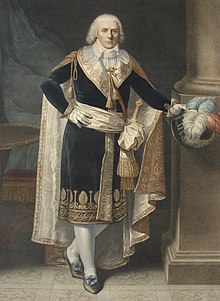Paul de Barras
Paul-François-Jean-Nicolas, Viscount de Barras (born June 30, 1755 in Fox-Amphoux , † January 29, 1829 in Chaillot ) was a French politician and member of the board of directors , in which he was the only one from 1795 until its dissolution 1799 was a continuous member.
Life
As a young noble officer, he served in India in a regiment in the city of Pondicherry
It was by chance that on July 14, 1789, he witnessed the storm on the Bastille . Until then, Vice Count de Barras had no firm political ideas. He met Mirabeau at Sophie Arnould's . Perhaps it was this meeting that led him to join Freemasonry and then the Jacobin Club and get into politics as a Republican. As a candidate for the legislature for the Var , he failed. He then became a member of the National High Court in Orleans. After this was dissolved, he returned to Paris and was appointed commissar of the Italian army. The election to the National Conventionof 1792 then succeeded and he voted for the execution of Louis XVI. In 1794 he played a key role in Robespierre's fall from the 9th Thermidor . He later became President of the National Convention.
In 1795, Barras, known as a corrupt bon vivant, was one of the first five directors to head the state. After the coup d'état of the 18th Fructidor V (September 4, 1797), the triumvirate of Barras, Louis-Marie de La Révellière-Lépeaux and Jean François Reubell took power on the board of directors .
Joséphine de Beauharnais , future wife of Napoléon Bonaparte , was his lover . Barras promoted the young general who had put down a royalist uprising against the Directory for him in Paris by entrusting him with the leadership of the Armée d'Italie and later supporting the Egyptian expedition .
Napoléon Bonaparte's coup d'état of the 18th Brumaire VIII (1799), however, forced Barras to resign. Barras had favored both General Napoléon Bonaparte's and Joseph Fouche's rise, which did not prevent the two from deposition and exile. Only after Napoléon's abdication did Barras return, although he was also stigmatized as a regicide (Régicide).
At the end of his life, Barras wrote his memoirs in Chaillot, in which he expressed his bitterness for Fouché and Bonaparte. Paul Barras was buried in the Père Lachaise cemetery.
Works
- Mémoires de Barras, membre du Directoire. Publié avec une introduction générale, des Préfaces et des Appendices par Georges Duruy , 4 volumes; Paris: Hachette, 1895-1896
literature
- Jacques Vivent: Barras. Le "Roi" de la République, 1755–1829. Hachette, Paris 1938.
- Arnold Steiniger: A bon vivant as a statesman. The Viscount de Barras. License issue. German Book Association, Berlin et al. 1953.
- Christine Le Bozec: Barras . Editions Perrin, Biographies, Paris 2016, ISBN 9782262047092 , ( French ) presentation of the book, publisher's page
Web links
- Literature by and about Paul de Barras in the catalog of the German National Library
Individual evidence
- ↑ Otto Flake The French Revolution , Manesse edition, p. 321
| personal data | |
|---|---|
| SURNAME | Barras, Paul de |
| ALTERNATIVE NAMES | Barras, Paul-François-Jean-Nicolas vicomte de |
| BRIEF DESCRIPTION | French politician and member of the board of directors |
| DATE OF BIRTH | June 30, 1755 |
| PLACE OF BIRTH | Fox-Amphoux |
| DATE OF DEATH | January 29, 1829 |
| Place of death | Chaillot |
